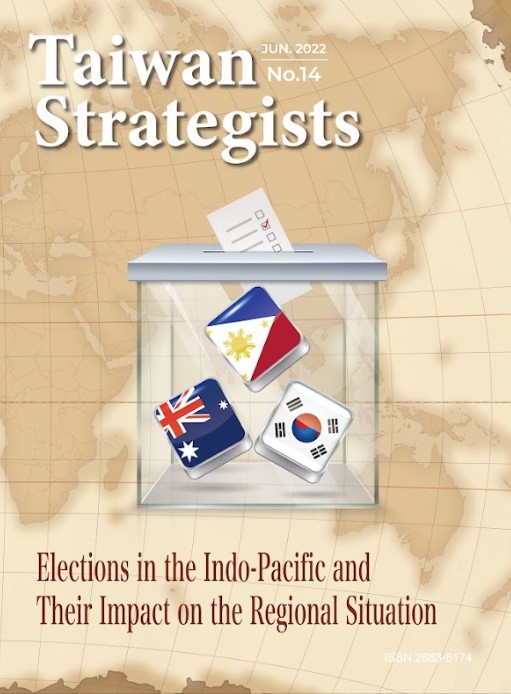Taiwan Strategists No. 14
The Impact of the Transfer of Power in South Korea on the Situation in Northeast Asia
Bumsig Ha
Professor, Korean Studies, Department of East Asian Languages and Literature;
Director, Center for Korean Studies, National University of Kaohsiung
Abstract
With the Yoon Suk-yeol administration taking office in South Korea, the country’s foreign and security policy are expected to undergo some changes. During the presidential election, Yoon announced a diplomacy and security pledge that included a policy against North Korea of “compensation after denuclearization measures” and a policy toward the U.S. of “rebuilding the South Korea-U.S. alliance and strengthening the comprehensive strategic alliance.” Yoon’s pledge emphasizes “strategic clarity” in South Korea’s foreign and security policy, prioritizing the South Korea-U.S. military alliance and emphasizing the realization of “peace by force” in inter-Korean relations. At the same time, the Yoon administration’s foreign and security policy risks strengthening the cooperative relationship between North Korea and China for having stimulated “geopolitical risk” in the Korean Peninsula. With the intensifying the U.S.-China rivalry and the Ukraine crisis, Yoon’s foreign and security policy cannot break North Korea’s will to build up its nuclear force. Moreover, it will likely strengthen triangular cooperation between China, Russia, and North Korea and thereby engender a confrontation in Northeast Asia between the U.S.-Japan-South Korea alliance versus a China-Russia-North Korea axis.
Keywords: South Korea, Transfer of Power, Yoon Administration, South Korean Foreign and Security Policy, Situation in Northeast Asia
The 2022 Philippines Presidential Election and its Influence on Asia-Pacific Geopolitic
Ya-wen Yu
Associate Professor, Department of Diplomacy and International Relations;
Director, ASEAN Studies Center,
Tamkang University
Abstract
In the 2022 Philippines General Election on May 9, 2022, Ferdinand “Bongbong” Marcos Jr. and Sara Duterte were elected as the new president and vice president. The election results will not only affect the direction of the Philippines’ foreign policy choice of embracing the U.S. or leaning on China, but also influence the ways the Philippines deals with the U.S.’ Indo-Pacific strategy and the South China Sea disputes. Although most of the media see Ferdinand Marcos Jr. as China-friendly, this paper argues that the new president will adopt a hedging strategy between Washington and Beijing — that is, a combination of economic cooperation with and military confrontation against China in order to protect the national interests of the Philippines.
Keywords: 2022 Philippines General Election, Ferdinand “Bongbong” Marcos Jr., U.S. Indo-Pacific Strategy, South China Sea Dispute, Hedging
Australia’s Indo-Pacific Strategy under the Albanese Labor Government
Chien-jung Hsu
Adjunct Assistant Professor,
Department of Public Affairs and Administration, Ming Chuan University
Abstract
Australia’s enduring alliance with the United States continues to act as a crucial force multiplier for Australia’s security policy. Although the Australia-U.S. alliance has effectively advanced both nations’ interests for decades, the rise of China could affect such an alliance — in other words, when facing a rising China, Australia might have to modify its alliance with the U.S. and forge a closer relationship with China. In a decade or so, Chinese interference has gained increasing influence over Australian politics, business, society and even universities, and it was not until recently that Australia responded by implementing several tough policies against China’s influence operations on Australian society. Later, China unleashed its “wolf warrior” diplomacy and launched a trade war against Australia, prompting most Australians to regard China as a security threat to their country. Meanwhile, the Coalition government was also deeply concerned with China’s acts of expanding its footprint in the South China Sea and the Pacific. Following the election of Anthony Albanese, Australia is expected to maintain most of the Coalition’s foreign and defense policies, and Albanese has also made a firm commitment to Australia’s security alliance with the United States. Despite Australia’s economic and trade dependence on China, Australia, under the Albanese Labor government, is likely to prioritize its ties with the U.S. over those with China, particularly for the Indo-Pacific strategy.
Keywords: Albanese Labor Government, Indo-Pacific, Quad, AUKUS, Australia-China Relations




